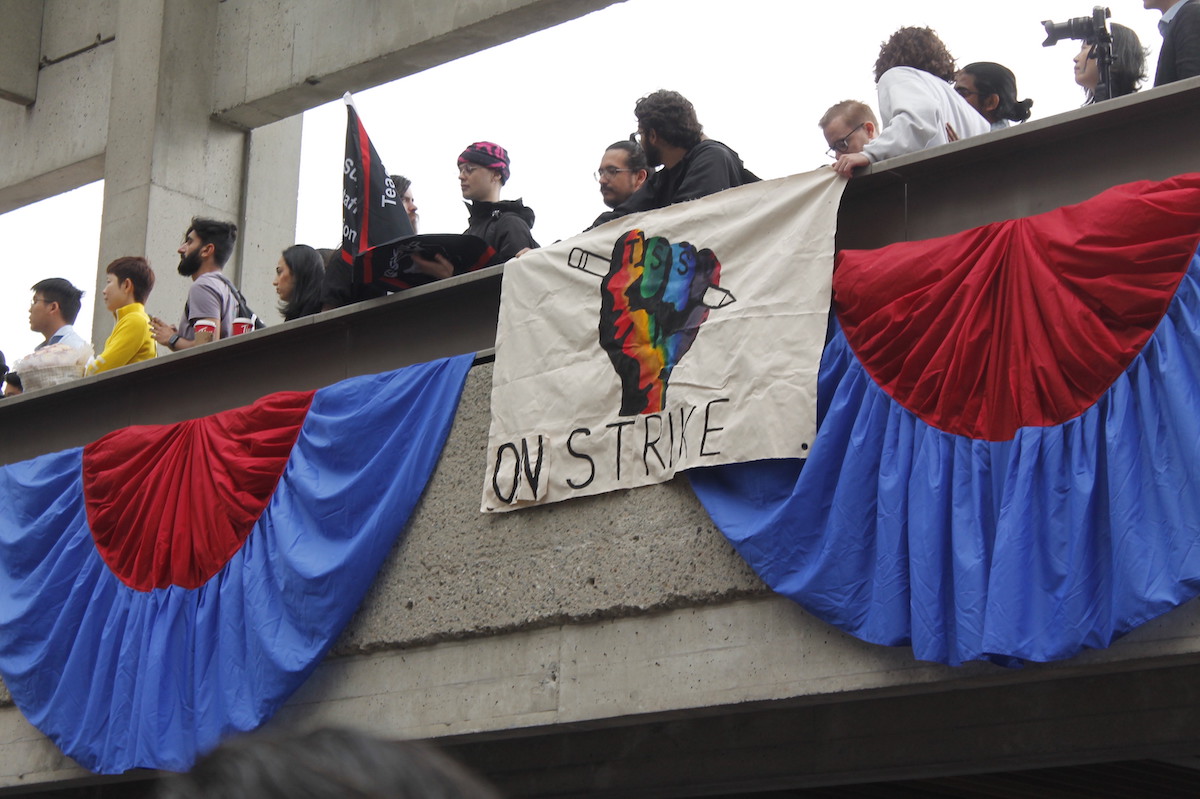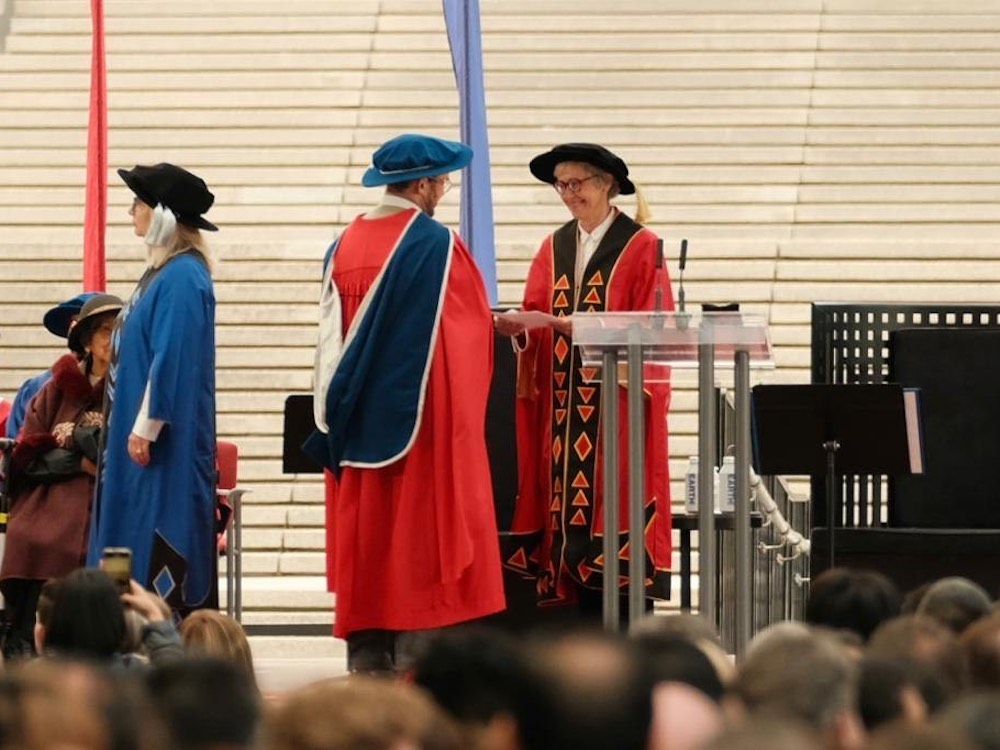Teaching assistants at Simon Fraser University began a job action Monday, launching a labour dispute that could affect classes at the province’s second largest university.
The Teaching Support Staff Union, or TSSU, gave its strike notice directly to university president Joy Johnson during a convocation ceremony for graduating students on Friday.
A graduating student gave Johnson the notice while crossing the stage. A group of TSSU members chanted “strike now,” blew a horn and unveiled a banner over the school’s concrete convocation mall, surprising parents and friends of graduates.
Amal Vincent, one of the TSSU’s two stewards, said roughly 800 student teachers would begin refusing overtime work Monday in the first phase of job action.
That could eventually escalate to a full-scale strike, including picketing of university buildings. Some other unionized workers at the school have said they’d refuse to report for work if the TSSU pickets their workplaces.
“We are prepared to strike for months if we have to,” Vincent said. “That’s where we’re at.”
The job action comes after months of unsuccessful talks at the bargaining table about pay and benefits for the school’s teaching assistants. Teaching assistants, often graduate students, do a range of work from marking assignments to running labs and tutorials.
It is also the culmination of years of tension between the union and the school’s administration over wages, contract workers and whether research assistants have a right to unionize.
SFU could not make a spokesperson available for comment before deadline.
In an online statement, the university said a “TSSU strike has the potential to significantly disrupt SFU students’ academic pursuits and adversely impact other members of the community.”
“That is why SFU’s focus is to pursue all avenues that restart productive negotiations,” the statement said.
Noemi Rosario Martinez, a TSSU member, said the union served Johnson with the notice in the middle of a public ceremony to send a message.
“We’ve been wanting to do this for a long time because conditions are not good at the university,” Martinez said.
The TSSU’s last collective agreement with SFU expired in 2022.

Vincent said the union wants a base pay increase to all teaching assistants, some of whom are paid different amounts for broadly comparable work.
The union also wants pay to reflect growing class sizes at the school, Vincent said, and sought an option for long-time members to enrol in the university’s pension plan.
Vincent said the university presented an offer Thursday with a pay increase identical to the boost given to B.C. government employees under the province’s last collective bargaining mandate.
For members of the BC General Employees’ Union, that meant a 25-cent-an-hour base pay bump plus an increase of just under 11 per cent over three years, which could go up to roughly 14 per cent depending on the rate of inflation.
Teaching assistant compensation is given in the form of both pay and scholarship funding, said Martinez. Currently, the scholarship portion of that compensation is tax-free.
But Martinez said the school has proposed combining those types of compensation into a single, taxable paycheque, leaving less cash in students’ pockets.
Martinez said many teaching staff also work as research assistants. In both roles, she said, it is common for students to not be compensated for working overtime because of limited paid hours provided by supervisors.
“People are already really struggling, especially with the cost-of-living increase,” Martinez said. “Anything that could reduce our pay rate, even if there’s a percentage pay increase, that’s not acceptable.”
In its online statement, SFU questioned the level of support for the strike. It noted just 207 of the 875 eligible employees participated in the strike vote. Support for a strike mandate was provided by 91 per cent of those who voted.
SFU had objected to a previous strike vote held by the TSSU in March when 94 per cent of votes were in favour of a strike. The basis for SFU’s objection was that it included research assistants, who the school considers not to be workers.
For years, the TSSU and SFU have fought about whether student researchers at the school have the right to unionize.
SFU voluntarily recognized the TSSU as a representative for those researchers in 2019.
But the next year it changed course, arguing that about half the researchers on campus were students receiving scholarships and not workers earning a wage, making them ineligible to unionize under the province’s labour code.
The University of British Columbia has since used a similar argument in its ongoing labour dispute with CUPE 2278, who filed to unionize that school’s student researchers earlier this spring.
The TSSU has relaunched a campaign for research assistants to sign union cards.
If research assistants become union members, Vincent said they could refuse to cross the TSSU’s picket lines if the strike escalates. So could other unionized staff at SFU, including office workers, faculty and even bus drivers.
CUPE 3338, which represents nearly 1,200 administrative and custodial staff at the school, says its members won’t cross any TSSU picket lines.
“We will support our fellow SFU workers,” CUPE 3338 president Shaneza Bacchus said.
Brian Green, the executive director of the SFU Faculty Association, said in an email that the association’s offices “will be closed in the event of a strike impacting our building, as our staff will not cross a picket line, and we will not attend to business in any area impacted by a strike.”
Green said faculty members “have the right to determine for themselves how they deal with a picket line, but the association has worked and will continue to work to ensure that our members understand their rights with respect to struck work and struck workplaces.”
CUPE, the TSSU and other labour groups on campus have also criticized the school for its treatment of housekeeping and food service workers who work for third-party contracting firms on campus. The school has pledged to become a living-wage employer but has not extended that promise to those contracted staff.
“The relationship has been bad, especially with the current labour relations team for the last three years or so,” Vincent said. “It is getting worse.” ![]()
Read more: Education, Labour + Industry

















Tyee Commenting Guidelines
Comments that violate guidelines risk being deleted, and violations may result in a temporary or permanent user ban. Maintain the spirit of good conversation to stay in the discussion and be patient with moderators. Comments are reviewed regularly but not in real time.
Do:
Do not: